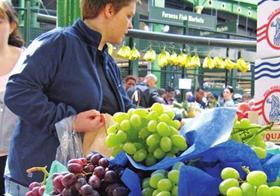
Nicholas Saphir’s groundbreaking review of the wholesale industry set out a vision for a thriving hub of composite markets that would use community engagement, education and food heritage to drive wholesale into the future.
Almost 13 years later and Saphir believes the UK’s wholesale industry is a missed opportunity that is only being kept alive by the “true entrepreneurial spirit of the wholesalers themselves”.
But despite an overarching failure to achieve the social and economic potential his report offered, Saphir says trends such as customer base, delivery hours and suppliers still offer a snapshot of the future.
Contrary to fears at the time, Saphir notes that the catering trade hasn’t consolidated entirely into large-scale foodservice outlets, and there are still many independent caterers and restaurateurs who rely on the wholesale sector. “Added to that is the rich immigrant community. Very often wholesale and catering is the first time immigrants engage with the economy. People often arrive with very few skills, except the skill to sell food or cook. So when Polish immigrants start cafes and supermarkets, where do they buy their produce from? It is a fantastic opportunity for wholesalers and one that hasn’t been fully taken advantage of.”
A composite market in London to match Paris’ Rungis has been discussed more than once in wholesale conferences, and Saphir explains why the sector’s increasing reliance on catering means the idea still has legs. “If you want to focus on the catering trade you don’t need five fruit and vegetable markets, you just need two or three composite markets,” he says.
“It is logical to have a composite market – New York has one, and so does Paris. That’s why the idea has legs, because no one can fault the logic of it. But the vested interests of those who run the markets are managing to hold it off.”
Instead, Saphir now believes future wholesale markets will become “commercially-efficient” operations that rely increasingly on distribution. “Future wholesale businesses will be more consolidated, smaller, and more focused on distribution, which has enormous implications for wholesale and its traditional role as a safety valve for oversupply.
“If you serve caterers, the opportunity to move surplus product is reduced, as menus are much less flexible. Markets will become service-orientated rather than price balancers.”
Wholesale veteran Charlie Hicks believes the line between suppliers and wholesalers will be increasingly blurred. “For example, Premier Fruits is a traditional wholesaler but they also own catering supply companies such as Cream of the Crop. And Total Produce is joining wholesale and catering supply facilities across its sites. What could happen is we might combine retail and wholesale on the same site, like what’s happened at Borough. So it would operate in the wee hours and then also have a retail side like Rungis, where they stagger the opening hours for different halls so the chefs can come down and look round the produce.
“That would be interesting and I can see that working, particularly in Bristol where there are lots of small restaurants with lots of talent but not much money.”
Anyone envisaging the future of the wholesale sector must surely see a more technologically-savvy market, and Hicks says the industry will look to build on its use of technology for stock control and invoice technology. “Social media, in terms of letting people know about new products, can only grow,” he says.
“And companies like Wellocks are already using online ordering, so I don’t see why this couldn’t spread into wholesale markets. We’ve already been doing this form of ordering through faxing, so why not turn it into online, it makes a lot of sense.”



